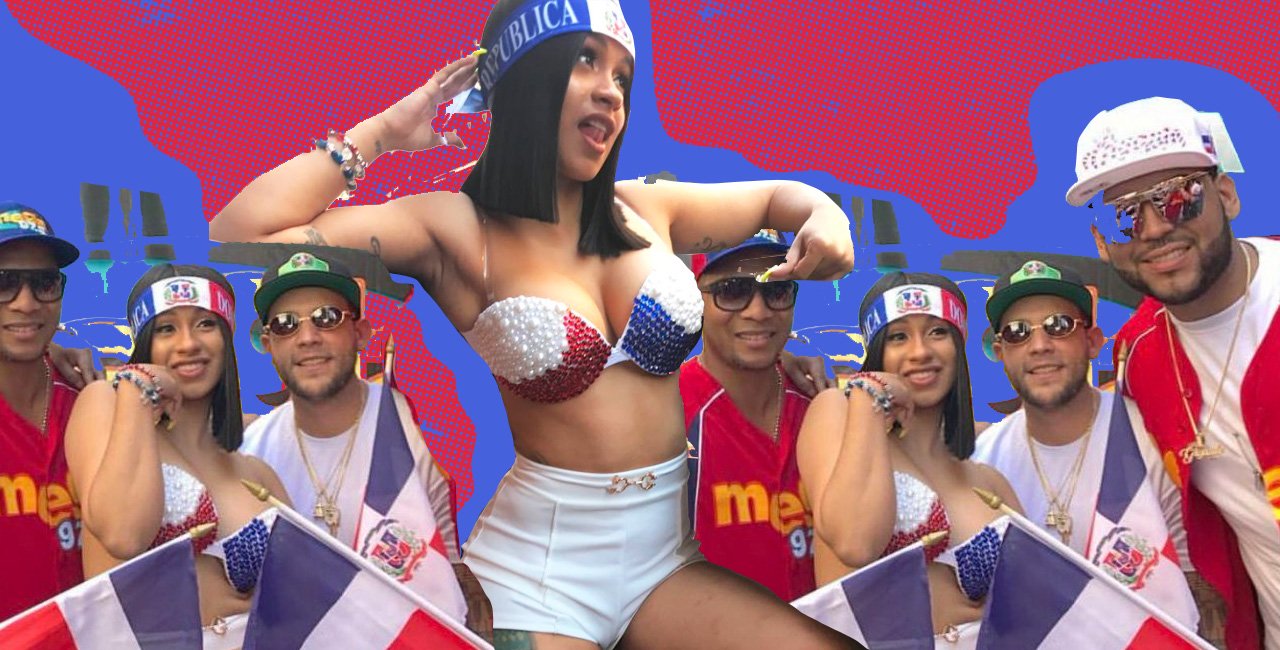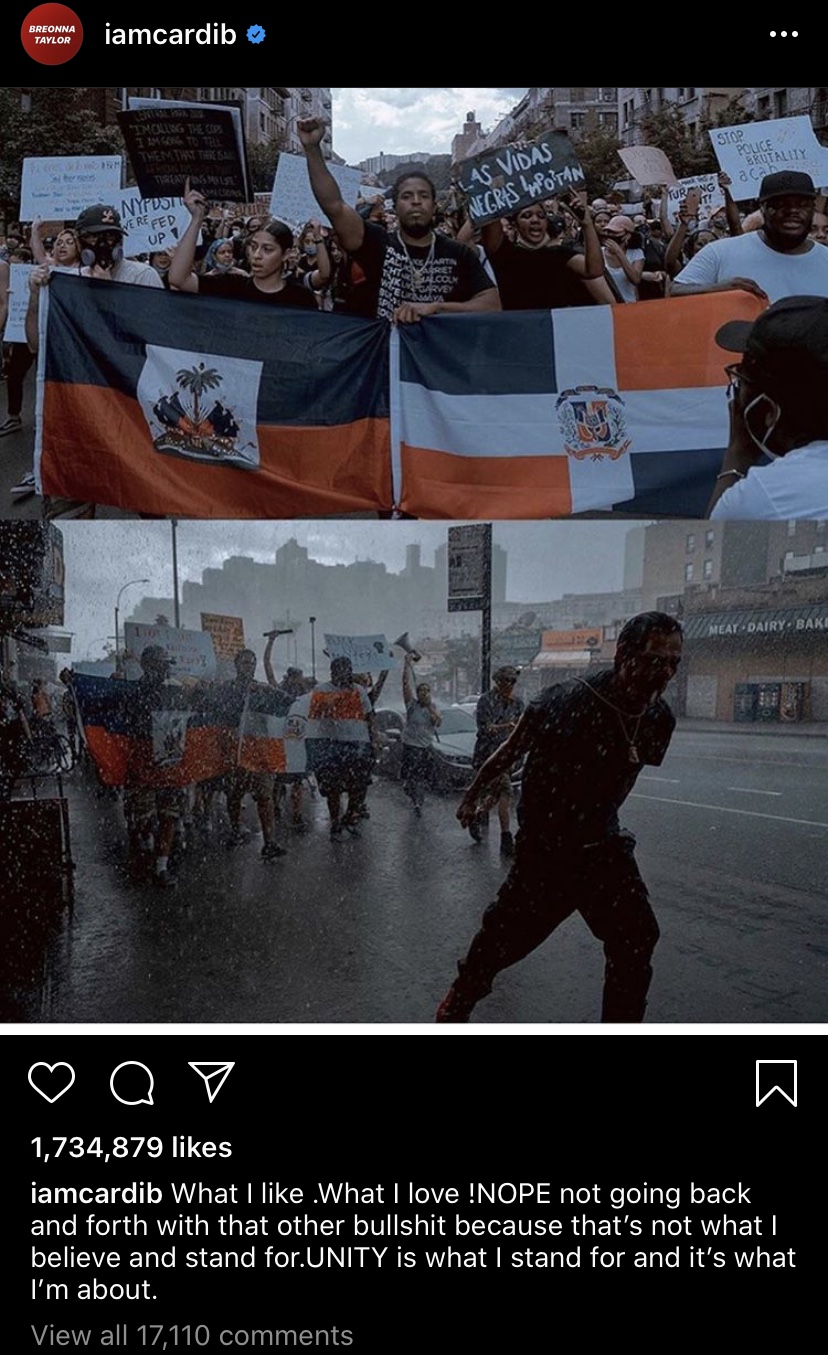
Cardi B and Aliany Garcia’s feud over Dominicans’ treatment of Haitians is a snapshot into history on Hispaniola
The rapper clapped back at an interview Garcia did on Univision about their feud on how Haitians are treated in the Dominican Republic.
On June 20, artist Cardi B defended her statements regarding Hatian and Dominican relations after Dominican singer, Aliany Garcia, criticized her again on El Gordo y La Flaca on Univision, which only aggravated their current feud.
It all began on June 8, when Cardi B reposted photos of protestors in New York marching with the Haitain and Dominican Republic flags side by side amid the Black Lives Matter protests in the U.S.
The post was applauded by other celebrities including Dominican artists, Emmanuel Matos and Amara La Negra.

Many Dominicans interpreted the symbol of “peace and love” for her desire for the island of Hispaniola to be a fusion of Haiti and the Dominican Republic instead of two separate countries.
Because of the island’s painful history and the tense relationship between the two countries, the backlash was profound even after Cardi B’s clarification for her desire of their unification not fusion.
In the follow-up post, she also included commentary on how she believed Dominicans should treat their Haitian neighbors.
The island of Hispaniola was the first European settlement in the new world to be divided by the French in Haiti and the Spanish in Dominican Republic where they both brought slaves.
The Spanish did not bring nearly as many slaves as the French, leading some Dominicans to pride themselves on the fact that their roots are more European than that of their neighbors.
On the flip side, Haitians are often looked down upon and mistreated because of their African roots.
The country’s anti-blackness is even embedded within the Dominican culture’s rejection of and drifting away from their African roots.
“Historically, racial tension and prejudice has always been a problem between these two nations and it still is today” reads the Children of the Nations, an international relief organization serving children.
The anti-Haitianism seen in their inhumane treatment can also be found in their legislation, and can be compared to that of Latinos in the United States.
That prejudice was amplified by the 1937 Parsley Massacre, where 20,000 Haitains were slaughtered – along with dark-skinned Dominicans that resembled Haitians.
The tragedy is often pinpointed as a sour turning point in the relationship between the two nations.
However, the exact point that many Dominicans referred to when shaming Cardi was the Haitiain invasion of 1801 and subsequent 22-year occupation.
It “would result not only in the economic and cultural deterioration of Santo Domingo {capital of Dominican Republic} but also in a resentment of Haiti by the Dominicans” wrote independent historian Caelen Anacker in a post about their history on BLACKPAST.
But the most notable response to Cardi B’s post came from fellow Dominican singer Aliany Garcia.
A Dominican Republic native, Garcia felt especially inclined to hit reply – which re-lit a 2018 feud – to Cardi’s statements and denying them as inaccurate and ‘hurtful’ to Dominicans.
She claimed they “opened a lot of hate and wounds” on El Gordo y La Flaca.
“This is a very delicate subject and we can’t talk about racism between Dominican Republic and Haiti because it isn’t a matter of skin color nor nationality. It is a matter of social security,” said Garcia in another previous video.
RELATED CONTENT
She continued with an approach resembling “All Lives Matter,” a phrase often used against the Black Lives Matter movement in the U.S on Univision:
“I understand if she wanted to relay a beautiful message of love,” said Garcia. “We are going through a time of global crisis where we can’t talk about one country or another because that brings lots of problems.”
She went on to try to simplify the situation, putting all the emphasis on love among people in general.
“We all need love since we are all humans – not just specific identities,” said Garcia.
Despite Garcia’s claims of Dominicans’ generosity towards Haitians in a previous video, Cardi took to Instagram once more to acknowledge the chilling effects of their history that still reigns on the island after Garcia’s Univision exclusive.
Cardi clapped back at Garcia and the others who condemned her.
“The White Americans that go to the country are treated very well and with respect. Those same people have you discredited on Youtube, make documentaries of the country and show how [you] treat the Haitians — that you treat them bad and are racist,” she said.
Cardi went on to clarify that she was not trying to do the same with her statement.
“When I was talking about how Dominicans need to treat the Haitians better, I never called them racist. So when I say ‘let’s treat the Haitians better’ you want to attack me,” she continued.
In previous videos aimed at Garcia she also elaborated on her initial post that started it all, adding that both Haitians and Dominicans were on an equal playing field in the U.S.
“Do you know why they were marching in Washington Heights where all the Dominicans and Haitians live? Because we want peace, we want unity,” said Cardi. “You can be a white or brown-skinned Dominican, a brown-skinned or light-skinned Haitian and either way in this country you’ll be treated like nothing.”
She reassured her Dominicans that she knows her history of the invasion and their mistreatment but “it’s over” and that they "need to have the peace and treat Haitians like people too.”











LEAVE A COMMENT: